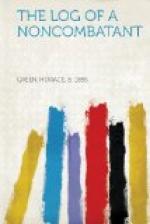“You know the road?”
“Yes, well,” said Verhagen; and so, partly because of charity and partly because we could have him as a useful guide, we took him into the car.
As we sped through the level lanes of poplars, challenged as usual by every Belgian regular or Garde Civique who could boast a uniform, the smooth green meadows of Flanders with their trim hamlets of stucco and tile seemed to deny the reports of savagery we had heard the night before. We had been told, and we had read, of German atrocities, and we had talked with survivors of Louvain. There was pillage, burning, and looting in Louvain, we had agreed, but the cruelty to women and children was the better part myth. And at all events, there was a semblance of cause for that. Perhaps there had been more resistance, more sniping by citizens than generally known, and perhaps the German side had not been fully explained.
Then suddenly Termonde lay before us. The center of the bridge was gone. Splintered timber sticking on end lay in the mud at the river’s side, along with iron beams torn by the charges of dynamite. The current was choked with masses of steel and wood. We crawled across some temporary beams reconstructed by Belgian engineers, and entered the ruins with a handful of Termonde’s citizens who had come back for the first time to see what was left of their homes.
“I will take you to the center,” said Verhagen. “That is where my house was.”
A quarter of a mile behind us, as the alderman sat upon a rock beside the gravestone, lay the thin neck of the Upper Scheldt, less than one hundred yards wide at this point, where it curved between the lines of charred and flattened buildings. We could still see the rush of water tumbling and splashing through the wreckage of the bridge we had just crossed. Twice it had been dynamited and twice rebuilt in part, so that at present a single line of slippery beams, suspended a few feet above the water and supported by some heavy wire, was all that remained between ourselves and the retreating road to Ghent. From the direction of Alost came the desultory boom of German guns; across the stream behind us the Belgian outposts whiled away the time with cigarettes and cards. Shaggy horses dozed against the gun trucks, and the men of artillery, some stretched at full length in the sun, others sitting bolt upright with arms folded, slept soundly on the gun carriages. We could hear the stream gurgling. We could hear the creak of a lazy windmill, and, coming somewhere from the smoking piles, the hideous howl of starving hounds. Of other human sounds there were none except the voice of Verhagen.
Ten days before Termonde had been a thriving town; that day it was a heap of smouldering ashes. America had heard a good deal about Tirlemont and Louvain, but not much of Termonde. Because this was a war of millions, it did not count in the news—for it was only a community of twelve thousand inhabitants, as pretty and quaint as the province of Flanders boasts, the prosperous center of its rope and cordage manufacture, with fifteen hundred houses, barracks, two statues, a town-hall, five churches, an orphan asylum, and a convent.




